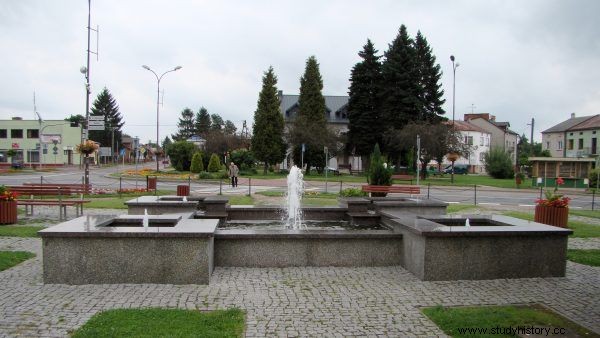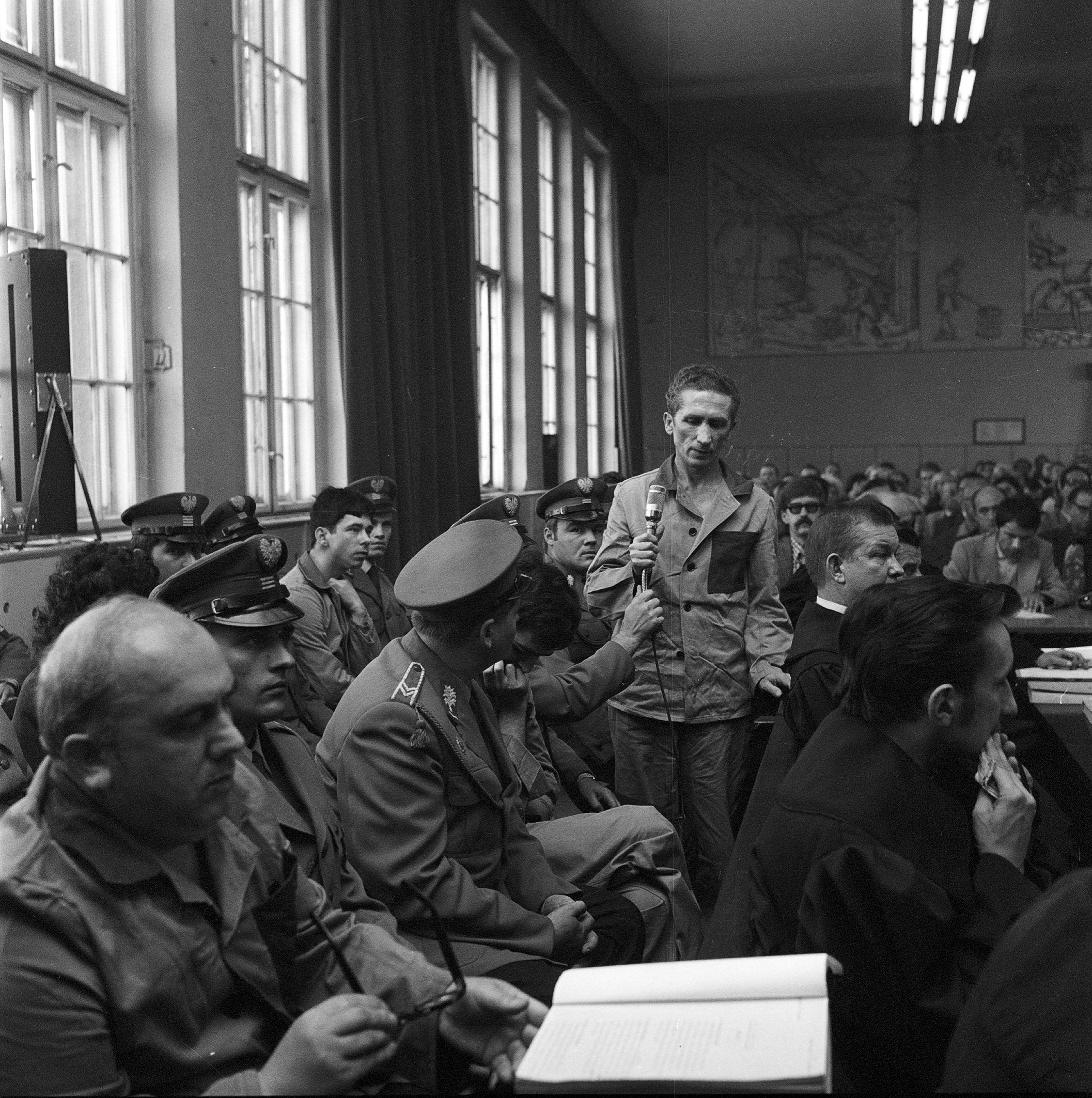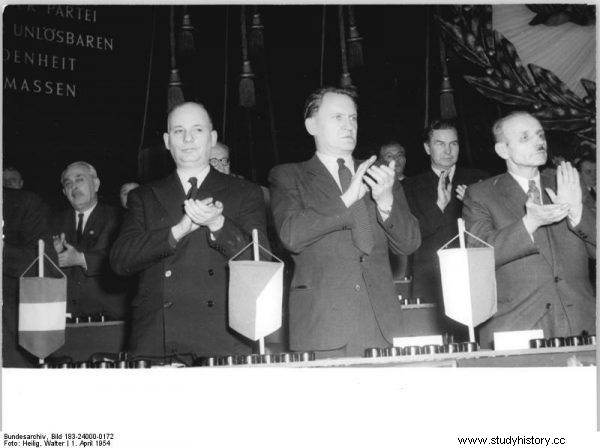Ah, who is it, ah who cares about me so? Militia, militia! - Jacek Zwoźniak sang. Police officers, often more interested in searching for "capitalist-speculative elements" than common criminals, were already the subject of jokes in the People's Republic of Poland. And it's hardly surprising.
On New Year's Eve 1971, a police station in Frampol in the Lublin region was broken into. Several weapons have disappeared from the armored wardrobe. The police began a large-scale search. Dozens of people were questioned, mostly opposition activists.
It was suspected that the theft was a prelude to military action against the socialist system. However, despite the action lasting over forty days, neither the perpetrator nor the weapon could be found.
All the policemen's mistakes
The mystery would have probably remained unsolved until today, had it not been for the fact that the "criminal" - Michał Łabęda, an ordinary boy from Frampol - himself admitted his guilt. He was arrested for stealing candy, but during questioning, he stated that he had taken the gun from the police station. He also revealed its hiding place. He had one of the pistols with him, hidden in his trouser leg, which was not noticed by the policemen who searched him during the arrest ...
It turned out that the police made a number of mistakes during the search. The haystack where the gun was initially hidden had been searched several times - just not thoroughly enough. When Łabęda decided to move the loot elsewhere, he just ... loaded the "tetettes" and "pepeses" into the sack and dragged them on a sled, passing several police patrols on the way. Later, when a warrant was sent for him in connection with the investigation (in order to verify his testimony against one of the policemen), he escaped without any problems. He was hiding in various places, and the officers encountered occasionally did not even try to identify him.

After a supply of weapons was stolen from the local police station on New Year's Eve 1971, the now idyllic town of Frampol became the scene of a large-scale… and extremely ineptly conducted search operation (photo by Pece, license CC BY 3.0).
Of course, the matter was classified. However, the ineptitude of the policemen was so glaring that the brochure "Theft of weapons from the MO in Frampol" by Henryk Nowicki and Jan Tajer, which was made available only to MO and SB officers, was used for internal training. But wasn't the problem of ineffective law enforcement officers systemic?
Militia to catch enemies of the people
Undoubtedly, the officers of the Citizens' Militia were disadvantaged by the fact that they were frequently used for purposes other than fighting common crime. This was due to the subordination of the militia to the security apparatus. Officially, in 1954, the separation of these two divisions of law enforcement services was decreed. In practice, however, as Piotr Majer, researching the structure and role of MO, argues, close ties - although from 1956 no longer under the aegis of the ministry of public security, but of internal affairs - remained until the end of the People's Republic of Poland. As Majer writes, "it necessarily made political interventions, investigations or other, even the most typical and necessary actions taken to ensure order and peace" .
And so, the militia were involved, for example, in the implementation of the three-year plan. Law enforcement officers helped enforce compulsory deliveries of grain, meat and potatoes from peasants. This often led to gross abuses, the correction of which directed the energy of security services in the wrong direction. For example, according to Marian Lipka, a former officer of the Warsaw Headquarters, it took a long time to resolve the case of a pregnant woman in custody on charges of shooting a policeman and unintentionally murdering her husband.

The investigation carried out after her complaint was received by the office of President Bolesław Bierut showed that everything was to be owed by ... the wounded uniform himself. When he tried to persuade the woman's husband to fulfill his compulsory deliveries, there was a scuffle. During it, his gun was accidentally fired, killing an innocent peasant. To avoid the consequences, the officer then shot himself and blamed the victim's wife in causing the accident.
The links with the security apparatus also determined the militia's priorities. In the economic field, for example, the fight against criminals from capitalist-speculative or kulak-speculative backgrounds was in the foreground ... In the "MO Work Guidelines for 1954 in the fight against crime in the national economy", progress in this area was assessed as insufficient, because only 15% of disclosed crimes were associated with capitalists, and 11.5% - with rich peasants. "We have not revealed enough criminals in capitalist-speculative circles, who bring the greatest damage to the national economy" - the authors of the document judged.
If you murder, it's only the speculators
The fact that the militia and the SB were busy looking for "enemies of the people" were often used by criminals, even of a heavier caliber. This was the case with Władysław Mazurkiewicz, a serial killer from the Stalinist period. This seemingly charming and old-fashioned gentleman searched for wealthy people, tempted them with the prospect of favorable interests, and then took them to a secluded place and killed by taking money. By no means did he perfectly cover up the traces of the crime, repairing numerous "fluffies" on an ongoing basis.

Serial killer Władysław Mazurkiewicz (second from right) talks to attorney Zygmunt Hofmokl-Ostrowski during a trial in Krakow, August 1956. Photo from the book "Zagadki kryminalne PRL" (Photo:PAP / CAF / Józef Rumianowski).
"Beautiful Władzio", as Mazurkiewicz was called, was not harassed by the police, he practiced his practice for years. At a later trial, he was only tried for six killings and two attempts, but it is suspected that his death toll may have been as high as thirty. He dropped in only in 1955, when one of his would-be victims came to the hospital with a bullet in the skull, and the police, having tracked Mazurkiewicz, found the bodies of another two people in his apartment. How did it happen that he had escaped justice for so long? Cezary Łazarewicz, quoted by the authors of the book "Zagadki kryminalne PRL", blames the Stalinist security apparatus:
There was a political battle going on. The communists imposed their system on Poland, in which the pre-war middle class was a suspicious and repressed group. Who would be worried about some missing banker, aristocrat, or money changer? It was one of the arguments of the defense that Mazurkiewicz helped the people's government to remove those whom it wanted to get rid of anyway.
This article has more than one page. Please select another one below to continue reading.Place whatever you can under the rug…
Increasing the operational effectiveness of the militia was also not helped by the fact that inconvenient cases were covered up as much as possible. After all, as Kazimierz Kunicki and Tomasz Ławecki note in "Criminal Riddles of the People's Republic of Poland", the thesis was that in a society building socialism, crime would decrease. As the statistics, unfortunately, did not correspond to the propaganda - so much the worse for the statistics. This is how another expert on socialist crimes, Przemysław Semczuk, described the situation:
The authorities went out of their way to create the impression that crime is solely a problem of the capitalist states of the rotten West. The bomb alarms on board LOT's planes to Moscow and New York, the threat of poisoning with potassium cyanide from the water intakes in Jelenia Góra (...) or the serial kidnappings of several-year-old children were not mentioned by the press or the TV daily. Few knew about them:policemen, security officers, prosecutors, judges.

Zdzisław Marchwicki (standing), the alleged "vampire from Zagłębie", in the dock before the Provincial Court in Katowice, March 1975. Photo from the book "Zagadki kryminalne PRL" (Photo:PAP / CAF / Kazimierz Seko).
There were attempts to conceal even the greatest crimes in the People's Republic of Poland. If this was impossible, such as in the case of the high-profile Vampire Basin case, it was minimized. Let's say "Dziennik Zachodni", informing about the outcome of the trial of a serial killer of women, "for the sake of balance" also described the story of the equivalent of our "vampire" from Vienna. The local criminal was killing his victims by strangling them with a scarf.
… or set up a demo
The whole of Poland lived in the case of the murderer from Zagłębie, who had acted with impunity for over 5 years and attacked 20 women during that time. It was not easy to hide, so a show trial was organized. In January 1972, Zdzisław Marchwicki was arrested. Soon his brothers were also accused of complicity in some of the crimes. The investigation, which lasted over two years and was publicized by the media, was fined with a death sentence for the "vampire" in July 1975.
However, this apparently spectacular success of the militia still raises serious doubts. No material evidence was found and only circumstantial evidence was used. Marchwicki's confession of guilt could have been forced. Similarly, as other testimonies concerning, for example, sexual contacts with cows, with his own sister, and even with his nephew ... Some of the information written in the prison diary, especially regarding the complicity of his family members in the crimes, was later questioned by the accused himself. No luck.

Marchwicki was also not saved from the conviction by the fact that he was not the only one who confessed to committing a series of murders. Some time before his arrest, Piotr Olszowy came to the police station to say that he was the famous killer. He was released due to lack of evidence, without carrying out an on-site inspection and without even taking his fingerprints. When, ten days later, the man killed his wife and children and burned himself - together with his house and all his belongings - thus destroying any evidence, it did not make a big impression on the militia. She was already on the trail of Marchwicki ...
Antoni Wrona, who was arrested in 1960 for war crimes committed by a gendarme of the same name in the Masurian village of Obryte, also discovered how rashly the militia moved from circumstantial evidence to accusations. Although during the investigation and trial there were many indications that the arrested person was actually a completely different person , the court was quickly moving towards its verdict. Although the spelling of the name was different (the infamous gendarme had a double "n" in his surname) and the opinions of graphologists were at best inconclusive, Wrona was sentenced to death. Fortunately, the sentence was not carried out. It was annulled by the Supreme Court, announcing what was clear to Stanisław Podemski, who commented the case from the beginning:the Gendarme Wronna and the accused Wrona are two different people.
Not only 07
The policemen can be pointed out with gross negligence and ineptitude. However, it must be remembered that their situation was not easy either. In many cases, they did not have - which was emphasized especially by the aforementioned Marian Lipka - proper training and were doomed to their own invention. People's Poland also deprived itself of many thousands of valuable functionaries by carrying out purges in uniformed services.

Franciszek Jóźwiak (first on the right in the photo), the Commander-in-Chief of the Citizens' Militia in 1944-1949, advised ambitious policemen against undertaking higher education, arguing that it might expose them to the reluctance of higher-ranking officers without education (Bundesarchiv, license CC BY-SA 3.0 de).
They began with an order issued in June 1949 by the Minister of Public Security Stanisław Radkiewicz. According to it, "politically insecure" officers were fired. This could mean a bad social background, but also an unsuitable past, such as belonging to "hostile organizations" or employment in the sanacja authorities - primarily the State Police. The cleaning of the police apparatus involved thousands of people, including many experienced and well-educated officers of the investigative service.
Most of the new officers who wanted to be educated were discouraged. Lipka enrolled in preparatory courses for higher education and urged others to do the same. You, student, do not mess up and get down to work or you will end up badly - he heard from one of his superiors, a butcher by profession, who had only finished five classes. He was advised against too much drive to learn by the Commander-in-Chief of MO, Franciszek Jóźwiak ... And how to become Borewicz in such a situation?
